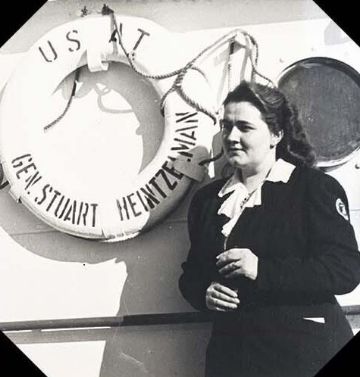Elfrieda Dyck
Elfrieda Dyck Klassen was born in Donskaya, Russia, in 1917, as the youngest of 14 children. In 1925 the family moves to Canada.
After training as a nurse, she is one of the first two women sent to Europe by the MCC (Mennonite Central Committee) relief organization during World War II, in a military convoy threatened by submarines.
During her assignments in England in the care of children and young people suffering from the war, she meets Peter Dyck. The two marry in 1944.

Elfrieda Dyck on the ship.
(Photo collection MCC).
For years the Dyck couple cared for Mennonite refugees in Holland, Berlin, Backnang and helped many to escape and emigrate by ship to South America. These ships are sometimes accompanied only by Elfrieda. The journey with the Charlton Monarch is particularly dramatic.
Throughout her life, Elfrieda, now also the mother of two daughters, has been involved in MCC relief work in the U.S. and Europe. Together with her husband, she wrote the impressive book Auferstanden aus Ruinen. (Up from the Rubble)
In 2004 she dies at the age of 84.
More information:
Voyage with the Carlton Monarch
"Let my people go!" It is July 1948. Elfrieda Dyck faces the hostile captain and crew of the Charlton Monarch and courageously speaks the words Moses spoke to Pharaoh in ancient Egypt. "Her people" are about 800 Mennonite refugees from Russia. Under the leadership of MCC (Mennonite Central Committee), they have embarked on the ship Charlton Monarch, hoping for a new life in Paraguay. After more than six weeks aboard a swaying ship that drifts without power most of the time, refugees aboard the Charlton Monarch are stranded in the port of Recife, Brazil. The shipping company stalls them with promises while the refugees remain in the dark, with spoiled food and no sanitation, 2,500 miles from their destination of Buenos Aires. 31-year-old Elfrieda, the only MCC representative on board, confronts the ship's senior officers and declares she will get her people off the ship.
With the help of the IRO (International Relief Organization), she begins flying refugees out to Asunción, Paraguay. She plans to do this every night for a week until everyone is off the plane. The old, the sick and mothers with newborns are sent out on the first of the night flights. When the captain sees that Elfrieda is succeeding in getting her people off, he moves the ship out of port to the free port, ostensibly to save on docking fees when the ship is repaired.
Undaunted, Elfrieda arranges for a boat to go from the ship to the dock several times a night. Children, the old, the weak: all climb down the emergency ladder in the dark with their meager belongings, along the outside of the ship, while the boat rocks up and down on the waves below. The Charlton Monarch set sail from Bremerhaven on May 16, 1948. The last of the refugees leave the ship on July 10 and eventually all reach Paraguay.
Ingrid Koss; Elfrieda Dyck (1917–2004); Willing Servant, Influential Leader in Profiles of Mennonite faith No. 52, Spring 2012, https://mbhistory.org/profiles/dyck-e/.
Peter und Elfrieda Dyck, Up From the Rubble: The Epic Rescue of Thousands of War-ravaged Mennonite Refugees, Scottdale, Pa., 1991. (dt. Auferstanden aus Ruinen, Kirchheimbolanden, 1994).
Peter Dyck; Movie by Peter Dyck - Charlton Monarch - Mennonitische Flüchtlinge, https://www.youtube.com/watch?v=MawT73jxWfk.



